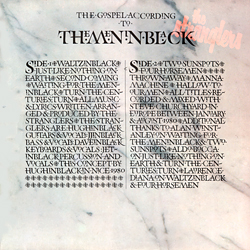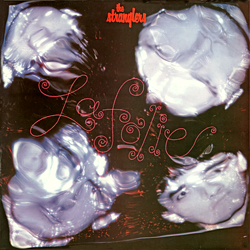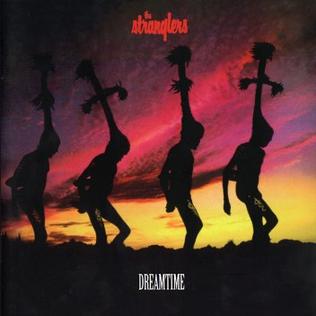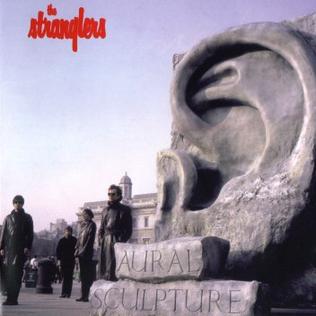Related Research Articles

The Stranglers are an English rock band. Scoring 23 UK top 40 singles and 20 UK top 40 albums to date in a career spanning five decades, the Stranglers are one of the longest-surviving bands to have originated in the UK punk scene.

"Golden Brown" is a song by English rock band the Stranglers, released as a 7-inch single on EMI's Liberty label in 1982. Noted for its distinctive harpsichord instrumentation, it was the second single released from the band's sixth studio album La Folie (1981). The single peaked at No. 2 on the UK Singles Chart, making it the band's highest-charting single in the country. It has also been recorded by many other artists.

The Raven is the fourth studio album by English new wave band the Stranglers, released on 21 September 1979, through record label United Artists.

Rattus Norvegicus is the debut studio album by English punk rock band the Stranglers, released on 15 April 1977.

The Gospel According to the Meninblack is the fifth album by English rock band the Stranglers, an esoteric concept album released 9 February 1981 on the Liberty label. The album deals with conspiratorial ideas surrounding alien visitations to Earth, the sinister governmental men in black, and the involvement of these elements in well-known biblical narratives. This was not the first time the Stranglers had used this concept; "Meninblack" on the earlier The Raven album and subsequent 1980 single-release "Who Wants the World?" had also explored it.

La folie is the sixth studio album by English new wave band the Stranglers. It was released on 9 November 1981, through the EMI record label Liberty.

Greatest Hits 1977–1990 is a compilation album by the Stranglers, released in November 1990 by Epic Records. It contains hit singles selected from their back catalogue from both EMI and Epic Records.

All Live and All of the Night is the second live album by English rock band the Stranglers, released on 8 February 1988 by Epic Records. The release peaked at No. 12 in the UK Albums Chart in March 1988.

Dreamtime is the ninth studio album by the Stranglers, released in 1986 by Epic Records. The title track was inspired by a belief of the aboriginal peoples of Australia called Dreamtime.

10 is the tenth studio album by English rock band the Stranglers, released in March 1990 by Epic Records. It was the last to feature guitarist/lead singer Hugh Cornwell. 10 peaked at No. 15 and spent four weeks in the UK Albums Chart.
Saturday Night, Sunday Morning is a live album by the Stranglers, released in 1993 by Castle Communications.

Aural Sculpture is the eighth studio album by the Stranglers, released in November 1984 by Epic Records. It was also the name given to a one-sided 7-inch single given free with a limited number of copies of their Feline album in 1983. The "Aural Sculpture Manifesto" on the 7" single was played before the Stranglers appeared on stage during concerts during both the 1983 "Feline" tour and the 1985 "Aural Sculpture" tour.
"Tramp" is a song included as a track on the Stranglers' sixth studio album, La Folie. "Tramp" was originally thought to be the ideal follow-up to their Top Ten hit single, "Golden Brown". However, Jean-Jacques Burnel convinced fellow band members that the album title track, "La Folie" was a much better choice. This backfired when "La Folie" only peaked at No. 47 on the UK Singles Chart.

"Always the Sun" is a song by English rock band the Stranglers, first released as a single on 6 October 1986, the second single from the band's ninth studio album Dreamtime (1986). A remixed version was released as a single on 24 December 1990. Both versions were Top 30 hits in the United Kingdom. "Always the Sun" was released in October 1986 in four different formats: a seven-inch single, shaped seven-inch picture disc, twelve-inch single, and as a double seven-inch single pack.
"Something Better Change", is a single by the Stranglers from the band's second album No More Heroes. It was released as a double A-side with "Straighten Out" in July 1977, and reached number 9 on the UK Singles Chart.

"No More Heroes" is a song by English rock band the Stranglers, released as a single from their studio album of the same name. It is one of the group's most successful singles, having peaked at No. 8 in the UK Singles Chart.
"Who Wants the World?" is a 1980 single by The Stranglers. The song, about alien visitation to Earth, is regarded as a precursor to The Gospel According to the Meninblack album - which explored similar concepts in more depth. Like the band's previous single, "Bear Cage", it was a non-album track. "Who Wants the World?" peaked at No. 39 in the UK Singles Chart.
"Thrown Away" is a 1981 song by The Stranglers. It was the first single from their concept album, The Gospel According to the Meninblack. This was The Stranglers' attempt at a Euro disco song, and the band were confident it would be a hit. However, despite an appearance on Top of the Pops, it could only reach No. 42 in the UK Singles Chart, and continued a two-year period of relative commercial decline for the band.
"Let Me Introduce You to the Family" is a 1981 song by English rock band The Stranglers. The first single released from La Folie, it peaked at number 42 in the UK Singles Chart.
"La folie" is a 1981 song by The Stranglers. The title track from La folie, it was released as the follow-up to "Golden Brown" in April 1982, and peaked at number 47 in the UK Singles Chart. Sung in French by bassist Jean-Jacques Burnel, it was Burnel who convinced his bandmates of the song's potential as a single, despite Hugh Cornwell feeling that "Tramp" was the better choice. The song makes allusions to Japanese necrophiliac murderer and cannibal Issei Sagawa.
References
- ↑ "Music Week" (PDF). p. 32.
- ↑ Roberts, David (2006). British Hit Singles & Albums (19th ed.). London: Guinness World Records Limited. p. 535. ISBN 1-904994-10-5.
- ↑ Cornwell, Hugh; Drury, Jim (2001). The Stranglers Song By Song. Sanctuary Publishing Ltd. ISBN 1-86074-362-5.